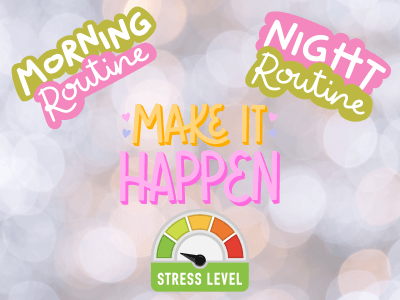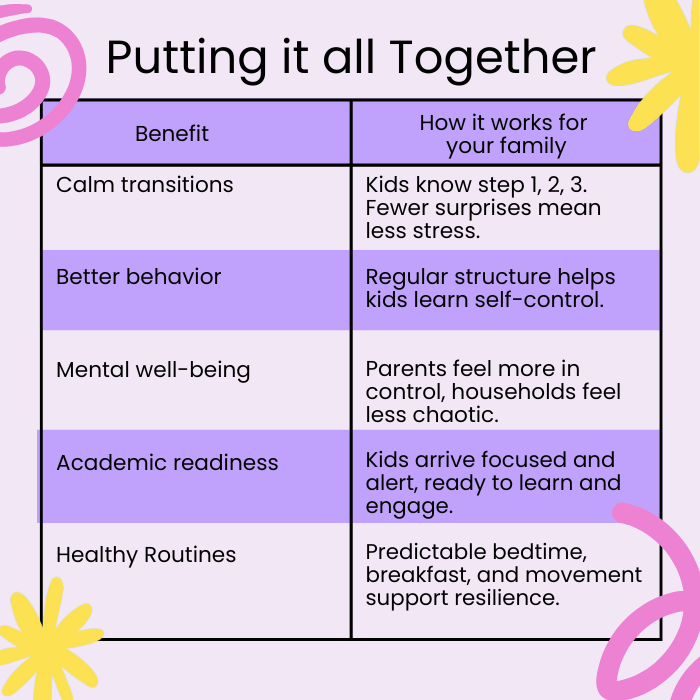Morning Mayhem? Here’s Why a School‑Time Routine Can Halt Stress
Morning Mayhem? Here’s Why a School Time Routine Can Halt Stress
Picture this. It’s Monday. Your child is dawdling over breakfast. You’re frantically packing lunches and uniforms. Shoes are missing. You’ve burned your tongue on coffee, and someone, maybe you, starts crying. Chaos wins again.
Now imagine a different scenario. A simple, steady routine: clothes laid out the night before. Breakfast ready. Calm steps. You’re sipping coffee. Everyone’s out the door with minutes to spare. Feels good, right?
Why does stress halt when routines start
Here’s what the research says:
Predictability equals calm. Kids thrive when they know what’s next. A clear routine gives them a sense of safety and control and lowers anxiety when transitions happen (Fiese et al., 2021).
Routines support self-regulation. Children who follow regular routines learn to regulate emotions, behavior, and focus better at school and home (Zero to Thrive, 2022).
Less parental stress. Household chaos correlates with increased stress, anxiety, and even depression in caregivers. Predictable school-day rhythms ease pressure on parents too (Marchetti et al., 2022).
Brain break ready. A routine that includes simple movement or breathing in the morning can activate the parasympathetic system, promoting calm alertness rather than stress jolts (Conway Medical Center, 2023).

What routines do in real life
Here’s a typical school-morning rhythm:
Pick out clothes and pack lunch the night before
Set out shoes and supplies by the door
Wake up at the same time every day
Have a healthy breakfast
Morning breathing or light movement, maybe a stretch, walk around the kitchen, or a five-minute breathing break.
When the alarm rings, the decision-making is minimal. Kids know what comes next. Parents avoid last-minute scrambling. That peaceful predictability makes mornings smoother.
Science says smoother mornings help the whole family
A Mayo Clinic child psychologist recommends practicing your morning routine a few days before the start of school. Being prepared and organized cuts anxiety and builds confidence (Mayo Clinic, 2022).
Experts stress that arguing in the morning wastes time and heightens stress. Staying calm and maintaining structure helps prevent meltdowns and tantrums (Child Mind Institute, 2023).
For teens, a consistent daily schedule, not just mornings but sleep and mealtimes too, offers emotional stability and helps those dealing with anxiety or depression feel safer (PrairieCare, 2023).

Tips to get started
without burnout
Tips to get started without burnout
Start two weeks before school begins. Gently shift sleeping and waking times back to school mode.
Involve your child. Co-create a visual schedule or checklist that they feel ownership of.
Do what works. Morning music or stretching helps gently wake the brain.
Keep it flexible. If a day derails, reset calmly and move on.
Above all, keep it consistent and straightforward. A routine isn’t a prison. It’s permission to breathe.
A final note
We all know school-time chaos can feel like running through a kaleidoscope blindfolded. With a clear routine, mornings can be consistent, calm, and even - dare I say, even enjoyable. Your kids arrive at school feeling ready. You arrive feeling less frazzled.
Now, if you're ready to turn that vision into reality, grab the editable Canva School Year Schedule template. It comes with areas to create your morning, afternoon, & weekend schedule. Bonus chore sections included. Download it, personalize it, print it, and give your school days structure that saves your sanity.
👉 Download the Editable Canva School Year Schedule now and watch your mornings transform.
References
Child Mind Institute. (2023). School mornings without the stress. https://childmind.org/article/school-mornings-without-the-stress/
Conway Medical Center. (2023). The 5-minute morning routine that sets up your child’s day. https://www.conwaymedicalcenter.com/news/topic/the-5-minute-morning-routine-that-sets-up-your-childs-day/
Fiese, B. H., Tomcho, T. J., Douglas, M., Josephs, K., Poltrock, S., & Baker, T. (2021). A review of 50 years of research on routines and rituals in family life. Journal of Family Theory & Review, 13(3), 316–331. https://onlinelibrary.wiley.com/doi/10.1111/jftr.12549
Marchetti, D., Fontanesi, L., Mazza, C., Di Giandomenico, S., Roma, P., & Verrocchio, M. C. (2022). The effect of parent–child routines on parental stress and child outcomes. Frontiers in Psychology, 13, 849130. https://pmc.ncbi.nlm.nih.gov/articles/PMC8916965/
Mayo Clinic. (2022). Mayo Clinic Minute: Building a back-to-school routine. https://newsnetwork.mayoclinic.org/discussion/mayo-clinic-minute-building-a-back-to-school-routine/
PrairieCare. (2023). School routines support mental health. https://prairie-care.com/resources/type/blog/school-routine/
Zero to Thrive. (2022). Why routines are good for kids. https://zerotothrive.org/routines-for-kids/




